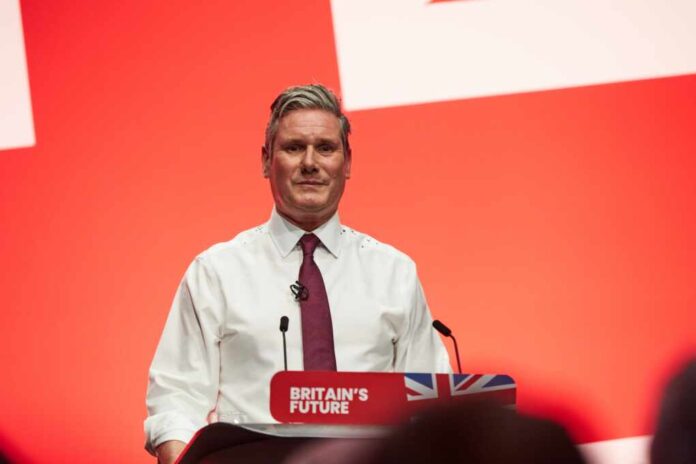
British Prime Minister Keir Starmer’s popularity has collapsed to record lows as Nigel Farage and his Reform UK party surge in the polls, threatening Labour’s tenuous grip on power less than a year after their landslide victory.
At a Glance
- Nearly 70% of Britons now disapprove of Keir Starmer’s leadership, with disapproval outpacing approval even among Labour supporters
- Nigel Farage’s popularity is rising dramatically, now surpassing Conservative leader Kemi Badenoch among Tory voters
- Starmer’s recent rightward shift on immigration has fractured his party while doing little to stem voter dissatisfaction
- Over half of Labour’s 2024 voters are considering switching to Liberal Democrats or Greens in future elections
- Two-thirds of Britons report feeling worse off since Labour took power, despite the party’s 174-seat majority
Starmer’s Popularity Collapses as Voters Abandon Labour
The latest YouGov polling has delivered devastating news for Prime Minister Keir Starmer, with approval ratings plummeting to their lowest levels since taking office. An overwhelming 68% of British voters now hold negative views of the Labour leader, while a mere 26% retain a positive opinion. Even more alarming for Labour strategists, the party’s brand has deteriorated rapidly, with 65% of voters expressing an unfavorable view of the party – the highest negative rating since June 2017.
Labour’s electoral coalition appears to be crumbling, with just 59% of those who voted for the party in the last general election still viewing it favorably. The government has faced a series of unpopular decisions, including means-testing winter fuel payments for pensioners and the perception that Starmer lacks strong political instincts or a clear narrative for the country. Two-thirds of Britons report feeling worse off since Labour took power despite the party securing a 174-seat parliamentary majority.
Farage Ascendant as Conservatives Struggle
As Starmer’s support collapses, Reform UK leader Nigel Farage has emerged as a significant beneficiary of voter discontent. Recent polling shows Farage’s personal approval ratings climbing steadily, even outpacing Conservative Party leader Kemi Badenoch among traditional Tory voters. This shift represents a remarkable realignment in British politics, with the traditional two-party system giving way to a more fragmented landscape where Reform UK has established itself as a major political force.
“We are in uncharted territory. We have never previously had a government starting with quite as low a share of the vote Labour got in July.”, said Sir John Curtice.
The rise of Farage comes as voters express frustration with Labour’s handling of key issues including immigration, the cost of living crisis, and access to healthcare. Focus groups indicate that voters will judge Labour on three primary metrics at the next election: the affordability of weekly shopping, accessibility of GP appointments, and reduction of small boat crossings across the English Channel. Thus far, the government has struggled to demonstrate progress on any of these fronts.
Immigration Policy Backfires on Starmer
Starmer’s recent attempt to pivot rightward on immigration policy appears to have backfired spectacularly. His “island of strangers” speech, intended to demonstrate a tougher stance on illegal migration, was praised by political conservatives, including Nigel Farage, who reportedly “very much enjoyed” the Prime Minister’s rhetoric. However, the speech has caused severe division within Labour ranks, with multiple MPs and party activists publicly disavowing their leader’s position.
The policy shift has alienated Labour’s progressive base without winning over right-leaning voters who remain skeptical of the government’s commitment to reducing immigration. A separate poll indicates that 52% of those who voted Labour in the last election would now consider supporting either the Liberal Democrats or Greens—a devastating potential exodus that could permanently reshape British politics. Meanwhile, Reform UK continues to gain ground with working-class voters in former Labour strongholds.
Labour’s Prospects for Recovery
Despite these troubling indicators, Labour strategists emphasize that the government has five years until the next scheduled general election—time potentially to reverse their fortunes. Party insiders hope that long-term economic policies will eventually deliver tangible benefits that voters can recognize. However, political analysts warn that early negative impressions can solidify in voters’ minds, making recovery increasingly difficult as time passes.
“If you preside over a market crisis, it’s game over – you are dead.”, added Sir Curtice.
Political consultants suggest Labour needs to establish a clearer identity as a moderate yet distinctly center-left government that offers policies both socially progressive and fiscally responsible. The challenge for Starmer remains balancing competing pressures from traditional Labour voters demanding more radical change, central voters concerned about economic stability, and the growing contingent of voters being drawn to Farage’s Reform UK with its clear messaging on immigration and national sovereignty.

























